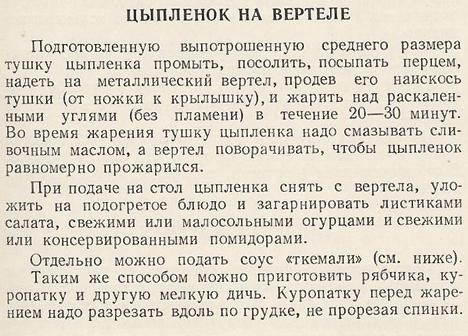
Chicken over coals with Georgian plum sauce. Source: Anna Kharzeeva
A great variety of good meat is not available if one lives in Moscow, so the tendency is to rely a great deal on chicken. So it was easy opting for a chicken recipe from the good Book for lunch; coal roasted chicken with Georgian plum sauce, tkemali; especially after I had that super healthy Soviet “pizza” for breakfast.
The recipes for chicken in the Book all begin with “butcher the chicken,” and there is a whole section dedicated to just that. I took advantage of the options my modern supermarket afforded to stay in my comfort zone and bought two chicken breasts.
Fortunately for chicken-lovers and lazy cooks like myself, there are plenty of cuts of chicken available – unless you decide at the last minute to serve chicken wings at a party – then all stores around you suddenly run out.
Unlike me, my grandmother isn’t about to start crowing from eating too much chicken, nor is she lazy – she just doesn’t tend to cook that much chicken. Maybe she overdid it on Bush legs back in the day, but more on that later.
This is what she remembers: “Back in the day you could only buy whole chickens – usually available at work cafeterias. They still had legs and heads on them, we and made a very popular dish – chicken tabaka – Georgian recipe : chicken fried as a whole and flattened out. Imported chickens were also sold whole, but they came packaged with stickers on. My friend was sent from work to a chicken distribution point, where his job was to take Israeli stickers off and put some other stickers on – the USSR had no diplomatic relations with Israel then.”
Granny also says that the first time she saw butchered chicken was in the mid-1960s in Estonia. She saw a lot more chicken parts, namely legs, when, after perestroika, the U.S. started exporting its chicken legs to the Soviet Union. Soviet citizens quickly nicknamed them “Bush’s legs” – after then-President George H.W. Bush – and just as quickly fell love with them.
“These legs were very popular, they were practically a salvation. You could just buy three legs instead of a whole chicken – it was convenient, cheap and it was available! There were rumors that Americans were just sending us their cheap legs they didn’t want – but everyone still loved them,” Granny said.
Granny told me this story and then went to see her old friend Galina Vassileyvna to, naturally, talk about food. Her friend grew up in the countryside and said that all of the above was only true about Moscow (which has always been a country in itself). Galina Vassilyevna said that in the villages and small towns people used to buy live chickens then kill and de-feather them at home. They only ever boiled it – whole – and on holidays they’d make chicken noodle soup using the broth, and would serve the boiled chicken as a second meal.
The boy in the family would get the chicken’s head – which meant he would become the head of the family one day, and the girl would get the wings – which meant she would fly away from home one day. Galina Vassilyevna found it most unfair and always envied her brother, because the head had the delicious brains in it! She said that the Bush legs didn’t make it to her village either, but people would send them there from Moscow.
The chicken I made had no head or wings, political connotations or deeper meaning – it did have a nice flavor and garnish though, which is how I tend to like my poultry.
Chicken over coals with Georgian plum sauce

The recipe from the Soviet Cook Book, page 189
Rinse the chicken, sprinkle with salt and pepper and put on metal skewers. Cook over hot coals for 20-30 minutes. During the roasting, the chicken should be basted with butter and turned regularly. To serve the chicken, remove the skewers, put on a warm platter and garnish with lettuce leaves, fresh or salted cucumbers and fresh or preserved tomatoes.
Wash sour plums. Boil them in water. Drain the plums, reserving the liquid, and rub through a sieve. To the plums, add the liquid, crushed garlic, salt, pepper, cilantro or dill. Bring to a boil, then cool.
All rights reserved by Rossiyskaya Gazeta.
Subscribe
to our newsletter!
Get the week's best stories straight to your inbox